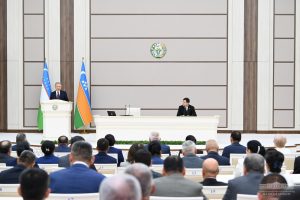Last week, Uzbek President Shavkat Mirziyoyev traveled to Karakalpakstan, an autonomous region within Uzbekistan that saw unrest earlier this summer over an unexpected constitutional proposal that would have written off the region’s nominal sovereignty.
At a meeting of Karakalpakstan’s Supreme Council (Jokargy Kenes) on August 26, Mirziyoyev oversaw the selection of a new leader for the region after accusing the region’s leadership of negligence and selfishness.
“…[T]he failure to find solutions to individual socio-economic problems is also at the root of the events of two months ago,” Mirziyoyev reportedly said, criticizing regional leaders for failing to meet the needs of people in the region.
Murat Kamalov, who had served as chairman of the Jokargy Kenes since October 2020, stepped down, claiming health issues, and the region’s former Interior Minister Amanbai Orynbaev was elected to replace him.
Under Karakalpakstan’s Constitution, the Jokargy Kenes’ chairman is the region’s top official. He is elected by the council in agreement with the Uzbek president.
Large protests in Karakalpakstan’s capital, Nukus, on July 1 were broken up by authorities as Tashkent immediately walked back the triggering constitutional changes. According to official sources, 21 died in the unrest and 243 were injured. The events were obscured by an internet shutdown and lack of access by most media to the region in the immediate aftermath.
For openDemocracy, Darina Solod laid out the chain of events that resulted in the protects, identifying a proximate trigger in the arrest of Dauletmurat Tazhimuratov, a regional journalist engaged in discussion around the proposed constitutional changes to Karakalpakstan’s status who had encouraged people to peacefully rally in opposition. Lalagul Kallykhanova, another journalist, was also detained. Solod cited one expert who noted that the proposed constitutional changes, suggested without clear discussion with the region’s people, “created problems where there were none.” Another expert, Rafael Sattarov, warned that leaving the region’s biggest problems — unemployment, lack of water, and rising prices — unaddressed would contribute to “separatist aspirations”:
Fears that Karakalpaks may secede from Uzbekistan are at least strongly exaggerated. If you think about it, renewed calls for secession only came at a time when people were completely indignant at what was happening in their republic and weren’t show[n] any understanding from [the Uzbek] parliament.
The referendum on a bevy of other constitutional changes will apparently still go ahead, though a date has not been set.
Mirziyouev flew to the region on July 2 to announce that the constitutional provisions regarding Karakalpakstan would be left untouched. In a speech on July 3, Mirziyoyev claimed that “external subversive forces” had manipulated the region’s youth into taking part in riots — no evidence of such forces has been presented.
The Uzbek president’s August 26 speech to the Jokargy Kenes more tightly focused on regional conditions as triggering the unrest — naming the three problem areas cited by Sattarov. According to a government readout of the president’s speech, Mirziyoyev noted that “despite all the efforts and huge funds allocated to Karakalpakstan, there are still problems in such issues as drinking water, internal roads, electricity, unemployment, prices.” In a different set of remarks, Mirziyoyev said again that the region’s youth had been led astray.
The Uzbek president also highlighted in his speech Tashkent’s investments in Karakalpakstan, the country’s poorest region and home of the desiccated Aral Sea. He also reportedly provided specific instructions to boost entrepreneurship in the region, including the halving of the income tax rate from 15 percent to 7.5 percent, the reduction of other taxes, and the allocation of 200 billion Uzbek soms ($18.3 million) for family business programs in addition to an already planned 650 billion soms ($59.5 million). He also addressed agricultural issues, pushing for a reduction in land used for cotton and grain and the reallocation of land to families in Karakalpakstan, plus 200 billion soms ($18.3 million) to farmers and 50 billion soms ($4.5 million) to residents for planting crops. A further 15 million soms ($1.3 thousand) will reportedly be allocated for well drilling and operation.
In essence, Mirziyoyev is throwing money at Karakalpakstan’s problems. This — and the aggressive crackdown on protests this summer — may result in a temporary kind of calm in the region. Left unaddressed is the question of how the people of Karakalpakstan, let alone the rest of Uzbekistan, can make themselves heard by the government.

































